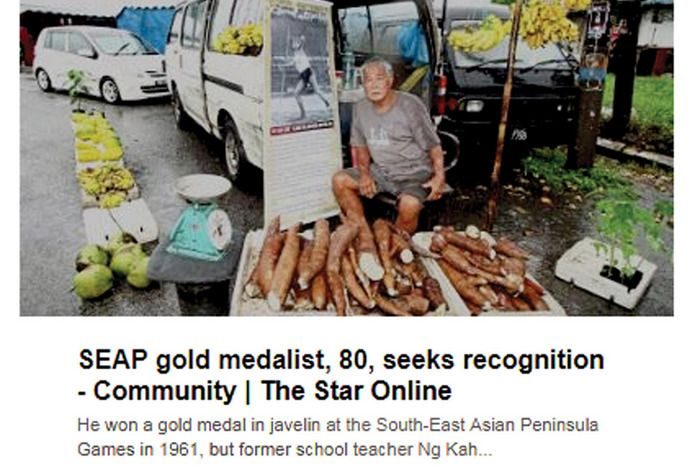Hopefully, Uncle Ng was honoured, as a VIP guest, at the SEA games


By Mariam Mokhtar


That man is Ng Kah Liew. Older readers may perhaps, remember him. He won gold, in the javelin event, at the 1961 South East Asian Peninsula (SEAP) Games. SEAP was the forerunner of the SEA Games.
Ng lives with his 70-year-old wife in Taman Seri Kota, Pokok Assam, near Kamunting. The father of four middle-aged children is a retired primary school teacher. The newspaper report said that he struggled to survive on his monthly pension of RM1200.
Being a keen gardener, Ng has for the past 20 years, woken at 6am every morning, so that both he and his wife can load up their van with fruit, like bananas, papayas, coconuts and potatoes, to sell at local markets.
Before making the 45-minute journey to Kamunting market and Bukit Larut, Ng will drop his wife off at the Pokok Assam market, where she tends a stall, selling chicken eggs. Life is hard. If they are lucky, they make around RM50 per day.
Ng’s father, who was proud of his son’s achievements, once believed that sporting champions would be taken care of for the rest of their lives. As Ng has sadly admitted, the reality couldn’t be more different.
The fame was short lived. After receiving the medals, Ng said that he and his peers faded into obscurity.
When he returned from Rangoon, where the SEAP Games were staged, sports officials gave him RM20 for the taxi ride home from Subang airport. In the days that followed, he and the other athletes, were feted with a celebratory dinner with Tunku Abdul Rahman, who was the prime minister at the time. After that, they settled back into their normal routine.
When our athletes proved themselves in the Olympic Games, in Rio, it must have filled Ng with mixed feelings. The media reports detailed the various incentives accorded to the athletes and this must have caused a certain amount of anger and resentment in Ng. The new were feted. The old simply faded into history. His own experience was humbling and nothing like the star-studded treatment of the current athletes.
He said, “I wanted to come forward after the Rio Olympics 2016, when medallists were showered with gifts and monetary rewards.
“What about former athletes who brought glory to the country?
“I’m not demanding monetary contributions. All I want is some form of recognition.”
Although he made it clear that he did not begrudge today’s athletes, basking in their new found fame and fortune, Ng simply wanted the nation to remember past sporting heroes and hoped that the Youth and Sports Ministry would contact former athletes like him, to see how they were coping, and perhaps, offer them a pension.
He said, “I just want the government to provide a little more recognition for former champions, especially those who have trouble making ends meet like me.”
Ng is right to express dissatisfaction. Some of today’s athletes are celebrities in their own right. They are given Datukships, sponsorships, and financial incentives. They are sought by various companies to promote their goods. Their faces are plastered on television, and magazines. They are asked to promote various clothes, shoes, watches and luxury cars. The lives of some sportsmen are comparable to mini-starlets.
Members of the opposite sex are attracted to them. Parents want their children to be like these athletes. Even royalty want to grab some of the limelight, which these athletes enjoy; but as Ng’s own experience showed, it was not always like this for the majority of our champions.
Soon after Ng’s plight reached the nation, last June, former sports writer, George Dass, told reporters that an event has been planned, for early 2018, to honour former sporting champions, and that Ng would be invited.
The National Athletes Welfare Foundation (Yakeb) also contacted Ng, to see if he could volunteer in the August SEA Games. They also mentioned featuring him in a slot on television.
Let us hope that Ng was recognised as an invited and honoured guest to watch the various events, at this year’s SEA Games. After all, he once did Malaysia proud.


